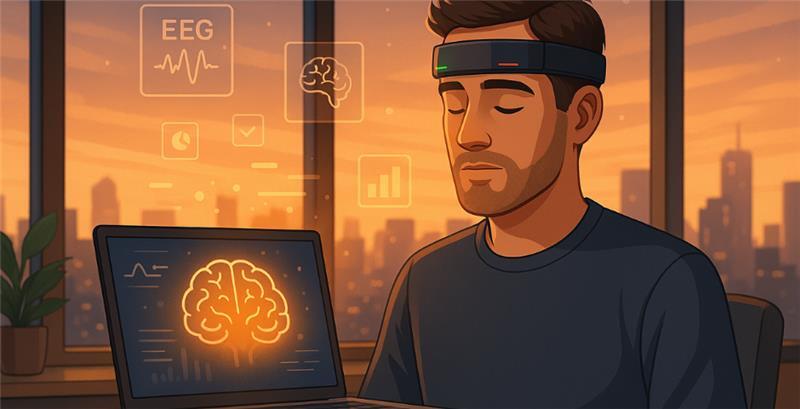In an age where mindfulness has become mainstream, burnout continues to rise. This article examines how neurofeedback offers a deeper, data-driven understanding of what it truly means to relax.
When Going Traditional Isn’t Enough: Neurofeedback and the Truth About Stress
A few years ago, I met a client who does mindful breathing every night without fail.
She would sit quietly for twenty minutes, eyes closed, breathing deeply. Her colleagues admired her discipline (and so did I!). She felt calmer, or at least thought she did, until the day she crashed.
Sleeplessness. Racing thoughts. A complete inability to focus.
Her burnout had arrived quietly, and by the time she noticed, it was already too late.
That experience stayed with me.
As a cognitive psychologist, I’ve since seen the same pattern play out over and over again. Good intentions, strong effort, but no real way to know whether the brain is actually unwinding. We expect ourselves to “feel” when stress is building or fading. Yet the mind is not always a reliable narrator. It whispers until it suddenly screams.
And this is where traditional stress management falls short.
Chronic stress and burnout have become defining mental-health challenges of our time. Globally, 77% of employees report experiencing burnout at least once in their current roles [1]. In response, many individuals turn to familiar stress-management practices such as meditation, deep breathing, and journaling. While these tools can offer temporary relief, their impact often fades because they rely almost entirely on subjective self-awareness. Most of us simply do not recognise when cognitive overload begins; we only notice stress once physical or emotional symptoms have intensified. Without objective insight, we cannot know whether we are genuinely relaxing or simply hoping we are.
How Neurofeedback Closes the Gap
This gap between intention and measurable progress is what I call the Galini Gap.
This is where digital brain wellness and neurofeedback offer meaningful change. Instead of relying on self-report, users can now access real-time insights into their neural state through an EEG headband, making stress management objective, trackable, and personal. Galini, Neeuro’s digital brain wellness solution, brings mindfulness-based relaxation together with neurofeedback from the SenzeBand 2, changing how individuals understand and manage stress.
Users gain visibility into their neural patterns associated with stress and relaxation, including how long it takes to relax and how long relaxed states are sustained, supported by alpha-wave activity measurements. In contrast to traditional approaches, this supports proactive stress regulation by making internal cognitive processes observable and measurable. Stress management now becomes guided by data rather than speculation.
Data, Not Guesswork: Digital Brain Wellness Rooted in Science
A growing body of research increasingly supports the role of neurofeedback in enhancing emotional regulation and reducing perceived stress. Recent findings show that alpha-enhancing neurofeedback is associated with reduced cognitive fatigue and improved self-regulation capacity [2], while others suggest that neurofeedback can reinforce adaptive neural activation patterns related to calmness and attentional control [3]. These studies highlight that digital brain apps are not just a wellness trend but are grounded in measurable neurophysiology.
Ultimately, Galini represents a new generation of digital brain wellness: precise, personalised, and grounded in neuroscience. By making internal processes visible and actionable, people are motivated to train attention, understand cognitive workload, and build long-term resilience. Stress management is now about listening to the brain and responding intelligently.
Find out more about Neeuro’s Galini and SenzeBand and how it supports digital brain wellness here: Unleash the Power of Mindfulness Relieve Stress with Galini
About Darwina Azmi
Darwina Azmi is a Cognitive Psychologist and Global Solution Manager, applying neuroscience and digital innovation to develop solutions that enhance brain wellness and support mental resilience worldwide.
References
-
Deloitte (2024, June 5). Is a “covering culture” undermining your organization’s well-being efforts? Deloitte Insights. https://www.deloitte.com/us/en/insights/topics/talent/identity-covering-could-be-undermining-workplace-well-being-efforts.html
-
Luctkar-Flude, M., Lawrynuik, A., Wall, E., & Tyerman, J. (2025). Investigating the effects of meditation technologies on nursing student stress and anxiety: Results of a pilot feasibility study. Teaching and Learning in Nursing. https://doi.org/10.1016/j.teln.2025.07.016
-
Ganesan, S., Van Dam, N. T., Kamboj, S. K., Tsuchiyagaito, A., Sacchet, M. D., Misaki, M., Moffat, B. A., Lorenzetti, V., & Zalesky, A. (2025). Neurofeedback Training Facilitates Awareness and Enhances Emotional Well-being Associated with Real-World Meditation Practice: A 7-T MRI Study. Mindfulness. https://doi.org/10.1007/s12671-025-02671-z







Leave a Comment